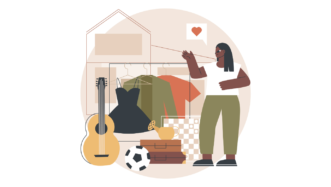LESSON OVERVIEW
In this lesson students watch a video, talk about being a good communicator and practise their listening skills.
VOCABULARY & LISTENING
At the beginning of the lesson students create a definition of communication skills by putting jumbled words in the correct order. They also discuss if they are good communicators and what being a good listener is. Then, students look at a list of seven tips of being a good listener and match the bolded words (e.g. interrupt, respond, react, etc.) with their meanings. They also have to explain what might happen if someone doesn’t follow the tips (e.g. What might happen if you interrupt the person who is speaking?). Next, students watch the video about listening skills and need to tick the tips from their list that the video mentions. During the second viewing, students complete other tips from the video with one word each. Finally, they discuss whether the tips are helpful and share their experience with being a good listener and talking to good listeners. They also consider how follow-up questions contribute to being a good listener.
SPEAKING
In this part of the lesson, students need to match halves to create seven follow-up questions (e.g. How long did it take?, Would you like to do it again?). Then, they look at two situations and decide which of the follow-up questions were asked in each of them. Finally, students get cards with question beginnings. In pairs, one person chooses a topic to talk about and the other one tries to be a good listener. They need to ask their partner follow-up questions using the beginnings from the card. Students keep the conversation going until they have used all the questions. This way they get the chance to practise their listening skills as well as forming follow-up questions.
Subscribe to unlock these and many other Standalone lesson with the Premium planWORKSHEETS













I wasn’t able to use the LET’S TALK part. student a,b,c etc. Any extra help?
Hi! Everything seems to be working on our part. Please email us at [email protected] and explain what the problem was exactly so that we can help.
Dear Ewa,
I suppose this fantastic lesson rather belongs to a level B2 instead of B1. I gonna try it tomorrow. 🙂
Szilvia
Thanks, I hope you and your students enjoyed the lesson 🙂